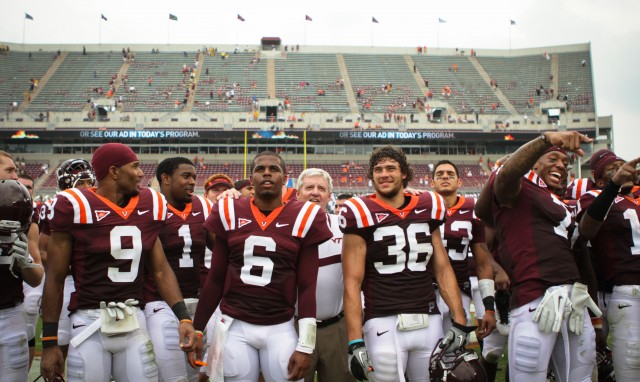
Virginia Tech's football team celebrates a win. This decision could have major ramifications football players across the country. (Mallory Noe-Payne/WGBH)
In a ruling that may have widespread effects, the National Labor Relations Board says football players at Northwestern University are employees and entitled to unionize.
The ruling announced Wednesday carries implications for private colleges and universities in New England and across the country.
If the ruling is upheld, scholarship football players at Northwestern would be able to collectively bargain and unionize because, the Board says, "they perform services for the benefit of their employer."
Players who don't get scholarships would not qualify as employees because they don't receive compensation.
Peter Roby, athletic director at Northeastern University in Boston, says the decision surprised the higher education community and it could lead to a seismic shift in big-time college sports.
"If this decision holds, there are going to be other institutions that will find that their athletes want to unionize and be recognized as employees and it's going to fundamentally change the relationship between the athlete and the school," said Roby.
Roby believes the decision would make colleges and universities rethink the role of athletics on their campus.
"We've gotten to the point where a number of institutions are starting to act more like professional franchises than they are institutes of higher education," Roby said. "The only way we're going to get the genie back in the bottle is if the government gets involved."
In a statement, Northwestern says its student athletes are not employees but students, and the University is expected to appeal the decision with the National Labor Relations Board in D.C.
Meanwhile, Moody's Investors Services predicts Wednesday's ruling may hurt schools and the National Collegiate Athletic Association, leading to higher costs and challenging the college sports business model.
"For the NCAA, challenges arise from the potential for negative financial pressure from legal judgments, settlements, regulatory change or self-imposed policies," Moody's reports. Universities would face increased expenses and fiscal pressure in an already challenging higher education environment.
On Twitter, former Northwestern quarterback Kain Colter, who led the unionization effort, tapped out a message saying he was proud of his teammates.
"This is a huge win for all college athletes," Colter wrote.
Greater Boston asked the question: Should colleges pay their student-athletes?
Reactions on Twitter:










